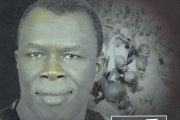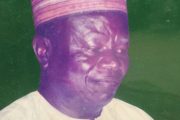 President Muhammadu Buhari danced into re-election politics in Abuja, Nigeria’s capital city earlier today when he formally told the National Executive Council, (NEC) meeting of his party he is set to seek re-election. He does no wrong by trying to seek a second term in office but he is doing so against the background of an earlier declaration of advanced age as well as an explosive break in rank among the members of the national cohort who have exercised the most influence on national affairs since the mid 1970s. The open break in consensus in this quarter is a completely new dimension to power struggle in Nigeria in that each of former president, Olusegun Obasanjo, former military Head of State, General Babangida, former Minister of Defence, General T Y Danjuma and many times former National Security Adviser, General Aliyu Gusau has his area of speciality in the power game. Is it incumbency or constituency that will then guarantee President Buhari’s re-election at a time each of these players have already and categorically told him to take his leave from power?
President Muhammadu Buhari danced into re-election politics in Abuja, Nigeria’s capital city earlier today when he formally told the National Executive Council, (NEC) meeting of his party he is set to seek re-election. He does no wrong by trying to seek a second term in office but he is doing so against the background of an earlier declaration of advanced age as well as an explosive break in rank among the members of the national cohort who have exercised the most influence on national affairs since the mid 1970s. The open break in consensus in this quarter is a completely new dimension to power struggle in Nigeria in that each of former president, Olusegun Obasanjo, former military Head of State, General Babangida, former Minister of Defence, General T Y Danjuma and many times former National Security Adviser, General Aliyu Gusau has his area of speciality in the power game. Is it incumbency or constituency that will then guarantee President Buhari’s re-election at a time each of these players have already and categorically told him to take his leave from power?
Nigeria is generally regarded as a nation of compromisers but is this going to be the case this time? What are the likely scenarios that could play out in the impending test of strength between wily, crafty former commanders now turned into political opponents of one of theirs? Is Nigeria heading for the ‘Bull in China Shop Scenario? Who will moderate the collision such that the ordinary folks do not come to harm?
There is a claim that it has never been different between these actors; that none of them ever left power without a similar break in rank and that the only new element in the current version is that it is in the open. According to General Danjuma in a previous interview, some elements in the Obasanjo regime developed reluctance to leave power in the 1979 transition programme. He said he had to veto any such thought. In 1993, Babangida left power only after irresistible pressure by members of the cohort, especially General Obasanjo who once called his regime a fraud. Babangida eventually declared he had lost his constituency. In the case of President Obasanjo in 2006, both IBB and General Danjuma were united in blocking what became known in the media as his ‘Third Term’ agenda. One of them reportedly told the sitting president not to carry the joke beyond a certain point. Shortly after, ‘Third Term’ was lost in the Senate and there was no whimper from the Obasanjo Presidency.

Can Senator Bola Tinubu, the president’s electoral Man Friday still fix things for him in 2019?
 What is thus new in this impending squaring – up is that it is all in the open. Obasanjo conveyed his own in an open letter in which he had no time for finesse or diplomacy in alleging nepotism against the president. IBB followed in his own uniquely mesmerising manner in also telling the president to let go of power. General Danjuma closed the rear by telling victims of armed bandits to rise up in defence of self, thereby scoring the Federal Government zero in the basic responsibility of securing the citizens from any extra-state power.
What is thus new in this impending squaring – up is that it is all in the open. Obasanjo conveyed his own in an open letter in which he had no time for finesse or diplomacy in alleging nepotism against the president. IBB followed in his own uniquely mesmerising manner in also telling the president to let go of power. General Danjuma closed the rear by telling victims of armed bandits to rise up in defence of self, thereby scoring the Federal Government zero in the basic responsibility of securing the citizens from any extra-state power.
The break in rank raises the question about how Buhari made it to power in the first case. Was it the case that it was actually not the consent but the vulnerability of the members of the cohort to the Buhari phenomenon? Or was it ‘Army Arrangement’: the retired military elite as an elite of power, a process which involves always looking for one of their own to take the job?
Whichever one was the case, what observers did not miss was how Obasanjo went to the First Akintola Williams Annual Lecture to implore Buhari to define his leadership or regime. He argued on the occasion that ‘they’ needed to change the situation preceding Buhari along with the actors. And that the change had been accomplished. What that suggested is that Obasanjo’s own exertions in accomplishing “Anything But Jonathan” were not on the basis of any concrete shopping list from the next regime. In other words, the cohort had no transformative agenda for whoever succeeded Jonathan. It went contrary to the assumption that the cohort was afraid that Nigeria was really in danger of being brought down by corruption and had reached for Buhari, one of its better known corruption fighters, to come and do the job. The assumption was the basis of support for Buhari from certain quarters and criticism of anyone who was campaigning against Buhari in 2015. Obasanjo’s statement at Akintola Williams’ 10th Anniversary in November 2016 showed the assumption to be a figment of imagination since whatever came out of Obasanjo’s lips was from the horse’s mouth on the matter.
Some very senior citizens are asking why Obasanjo, IBB, TY Danjuma and Aliyu Gusau could not meet the president in the Villa, fight it out secretly in one dacha or another there without anyone knowing except close aides who would have been around each of the five ‘boxers’ to supply bandage in case someone hit someone else below the belt. That way, argues these senior citizens, the nation would have been saved the current spectre of ‘experts in the management of violence’ engaging each other openly.

Different faces of the cohort: can they still lock themselves in a Dacha and reach a consensus?
The contrary perspective overrules this analysis on the ground that the differences between the team on the one hand and President Buhari are irreconcilable. Or they would have since resolved them behind the scene even if it meant boxing themselves to consensus. While some people are speculating that the difference is what President Buhari might have up his sleeves should he win a second term, others say the main thing is the fear of the members of the cohort that Buhari is nepotism personified and could, without knowing it, break-up the country if he wins second term. The truth might be somewhere in between.
Of course, the break in rank is isolated for attention only because the players at that level are the most influential. Animus and apologia against and for the Buhari regime abound across the class, ethnic, religious, regional and even generational divides in Nigeria. For the majority, the issues are poverty, hunger and anger. All of these make 2019 a nightmare although some people would say the Nigerian ruling class is such a sophisticated class when it comes to pulling back from the brink. But if this class is that sophisticated, why does it allow things to degenerate to dangerous levels before making for pulling back?
What are the likely scenarios to expect? Some people think the president is not properly aware of the crisis of confidence around his exercise of power or he has forgotten how he came to power. Otherwise, he would not hope to take on opponents who are more entrenched than himself, internally and otherwise. Others are saying along with Chinua Achebe that if a hen suddenly launches a hot pursuit, the target should learn to run for dear life because there is no knowing whether the hen developed teeth over night. In other words, might Buhari have transcended the image of him as a recluse who dashes nobody anything to something else in the last few years and can take on any opponents, no matter how well located? And is the anti-corruption that teeth or joker? What about its possible contradictions?
It is a drama to be awaited. But, by eventually declaring his intention much earlier than the May 29th, 2018 that has been speculated, the president has shown that all attempts to persuade him not to seek a second term has failed. He is now fully in it, reducing everything else to who the opponents, individually or collectively, pick as his challenger. Who might be that person who is so complete in him or herself as to lead the opposition in Nigeria to overwhelm a ruling party in 2019? Only time will tell!




























